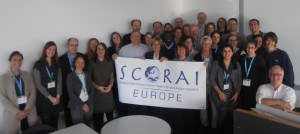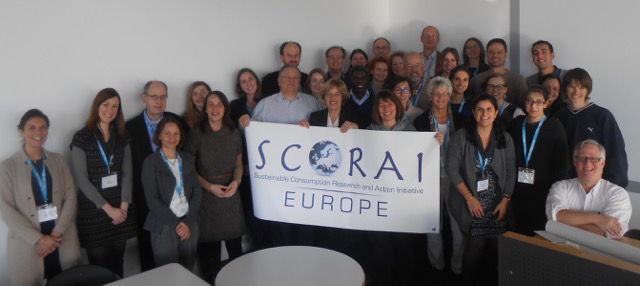The European chapter of the Sustainable Consumption Research and Action Initiative (SCORAI Europe) convened a two-day workshop in Lausanne, Switzerland from Monday December 8 to Tuesday December 9, 2014, as part of the ‘Anchoring inter- and trans-disciplinary sustainable consumption research in Swiss universities’ project, funded by the Swiss Academies of Arts and Sciences, Sustainable Development at Universities Programme:
“Sustainable consumption’ problem framing and research design: Can we be inter- and transdisciplinary and do we truly want to be?”, December 8-9, 2014. (Please download the workshop report here).
In addition, two special sessions took place:
“Sustainable consumption teaching” on December 8, 2014. The brief report is available here.
“Bringing participative methods to life” on December 10, 2014. The brief report is available here.
Participants
Please find a complete list of participants in the workshop report.

Workshop theme
‘Sustainable consumption’ is a growing area of research, practice and policy-making that has been gaining momentum around the world. Understanding why, how, in what way, and what we consume, in relation to environmental integrity and intra/inter-generational equity or more ‘sustainable development’ is a complex question – one that must be addressed by different disciplines and related methodologies, ranging, to name but a few, from sociology, economics, political science and psychology, to science and technology studies, history and environmental engineering.
This workshop takes as a starting point the need to address complex problems with complex approaches: to achieve transitions toward sustainable consumption, inter-disciplinary research is called for. Different perspectives and approaches should be acknowledged as being complementary rather than competitive, as far as possible, and respective accomplishments and possible synergies should be put forward. Yet little time is actually spent on understanding the basic assumptions and biases we carry with us as researchers, based on our own backgrounds and experiences.
The focus of this workshop is therefore on uncovering the disciplinary limits and opportunities involved in sustainable consumption problem framing and research design, and what the contributions from different perspectives can bring towards addressing the problem.
Our goal is to bring together researchers from different backgrounds focused directly or indirectly on ‘sustainable consumption’ to discuss and debate the following three central questions that touch at the core of interdisciplinary research:
- How is ‘sustainable consumption’ depicted and framed as a problem, from the perspective of different disciplines, and what are the underlying disciplinary assumptions? What can we learn from a discourse between disciplines towards collaborative problem framing? What perspectives are currently missing or underrepresented in the sustainable consumption discourse?
- How can different approaches to ‘consumption’, ‘transitions’ and ‘sustainability’ be integrated into research design, and which approaches are most suited for inter- and trans-disciplinary research? What are the limits and opportunities presented in collaborative research design?
- What is the state of ‘sustainable consumption’ research today, in terms of how the problem is framed and research projects are designed? Which are the knowledge gaps and future needs?
Focusing in on key topics
For this workshop, a series of subcommittees were invited to form and meet around specific topics and questions related to:
- Food consumption: apprehending complex systems, what does this really entail
- The good life and a new policy paradigm: relating human needs to resource management
- Energy transitions: innovations, co-responsibility and participatory forms of production
- The solidarity economy and collaborative consumption: questioning value systems, for whom and by whom
Hosts
The University of Lausanne Industrial Ecology Group
The University of Basel Programme Man-Society-Environment (MGU)
Main Organizers
Marlyne Sahakian, University of Lausanne
Antonietta Di Giulio, University of Basel
Organizing Committee
Maurie Cohen, New Jersey Institute of Technology
Audley Genus, Kingston University
Henrike Rau, National University of Ireland, Galway
Philip Vergragt, Tellus Institute & Clark University

